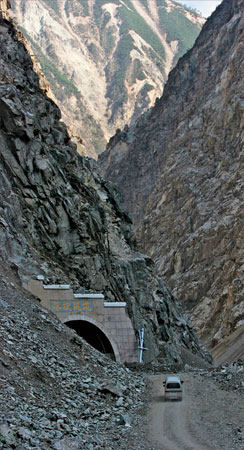Quake victim Guo Chengxing has been seeking refuge in a tent for more than a month since the disaster hit Sichuan province, but his house in Wenchuan county remains spotless.
|

A car stops before a tunnel that used to lead to Caopo of Wenchuan. Landslides have blocked the only road into the area since the disaster.
|
Every day, the 58-year-old returns to clean the home he bought a year ago with his life savings. Whenever an aftershock occurs, Guo throws down his cleaning cloth and flees the building.
Yet, Guo is not sure how long he can continue this routine. Wall cracks caused by the 8.0-magnitude quake are growing larger by the day. Continuous landslides from a nearby hill have buried the first four floors of the building just behind his house.
"Can we still live in here?" Guo asks as he stares at the cracks running through the bedrooms and living room.
It is a question puzzling the other 107,000 residents of the county, close to the epicenter of the May 12 tremor.
The county seat of Wenchuan also lies ominously on top of three fault lines, making its 40,000 residents vulnerable to potential tremors. Similarly, potential disasters such as landslides and mudslides threaten the lives of those in mountain villages.
Other quake-hit areas in the province share Wenchuan's worries.
Seven towns and three county seats have reportedly applied to be relocated, a draft reconstruction proposal prepared by related government departments has showed.
As the central and provincial governments study the reconstruction plans for the region, a number of experts are advocating for a massive relocation of residents from Wenchuan's uninhabitable areas.
Some say that the suggestion, if carried through, could alter the fate of tens of thousands of quake victims made homeless by the disaster.
Land lost
Wenchuan's county seat lies about 70 km northwest of Sichuan's provincial capital, Chengdu. It is surrounded by bare mountains and nestled in a narrow valley upstream of the Minjiang River. Covering an area of 3.53 sq km, the place used to be home to about 40,000 people.
With abundant hydropower and mineral resources, the county seat had grown from a small village in the 1950s to one of the most prosperous towns in the Aba Tibetan and Qiang ethnic autonomous prefecture.
If not for the quake, new buildings and factories would continue to sprout on its fringes, encroaching on the narrowing riverbed.
At first glance, visitors to Wenchuan are likely to overlook the damage caused by the tremor. The facades of most buildings appear to be intact, with few structures collapsed.
But like Guo's home, cracks have crept onto their insides, making them dangerous to enter and even costlier to dismantle, compared with those already being reduced to rubble.